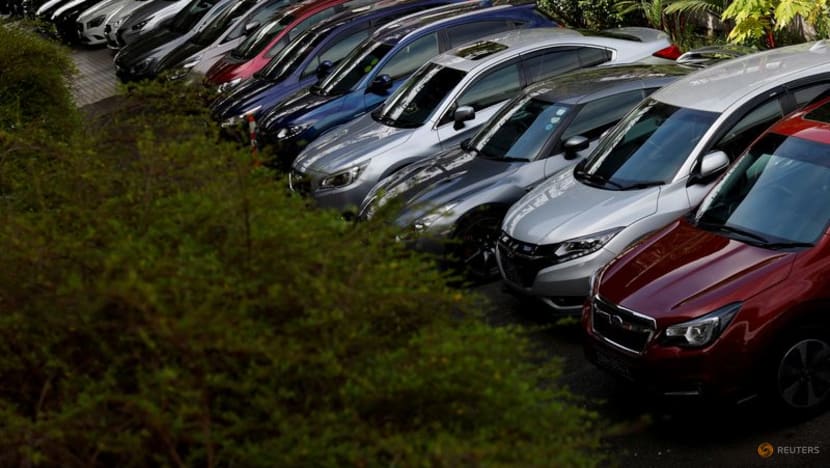'A 33-year-old system has to be tweaked': Analysts on why the COE system needs a review
With COE prices climbing, online commenters have questioned if Singapore's system of controlling the car population is broken. CNA asks experts if the system is still working as intended.

19 Oct 2023 06:00AM (Updated: 19 Oct 2023 09:41AM)
SINGAPORE: In the 33 years since Certificates of Entitlement (COEs) for vehicle ownership were introduced, the system has controlled Singapore’s car population.
But private vehicles are now being used for ride-hailing services, and the COE system has not gone through a “more fundamental review” to deal with such changes, experts told CNA.
On Wednesday (Oct 18), COE prices for cars again reached new highs. COE for smaller cars in Category A climbed to S$106,000 (US$77,500), while Category B cars, which are larger and more powerful, breached an eye-watering S$150,000.
As records continue to be broken at each COE bidding exercise, members of the public have questioned if the system is broken.
One commenter on a CNA Facebook post said Singapore is being “penalised unnecessarily by a good system gone rogue”. Another said it is not effective because there are still traffic jams and called for it to be abolished.
CNA asked analysts if comments that the system is beyond repair are valid, or if the system is working as it should.
Private cars being used for business purposes may be causing prices to climb, they said. For example, consumers have to compete with rental companies and buyers who intend to use the cars as private-hire vehicles.
“PHVs and car rental fleets could be playing a considerable role in the all-time high COE prices we are presently seeing,” said Mr Yeo Swee Guan, a management associate at Motorist Singapore.
“While the cost of a COE at current prices may be an extremely considerable expense to individuals and families, they would be less of a concern to companies whose businesses are in rental or leasing.”
Buying a vehicle makes sense for those who are using it for business, such as rental fleet owners or those who drive private-hire vehicles, said Mr Ng Lee Kwang, board adviser at industrial vehicle leasing company Goldbell Corp.
“As individual buyers, we don’t have a (profit and loss statement),” he said. “We buy the car and we’re stuck with it."
Private-hire cars can be converted to personal vehicles for sale. The conversion costs S$100 (US$73).

The Big Read: Despite sky-high COE prices, Singaporeans’ car dreams never fade

LTA to look into supply of taxi, ride-hailing services in review of point-to-point industry
More generally speaking, transport economist Walter Theseira said that the distribution of COEs across vehicle types and uses is based on Singapore’s vehicle numbers in 1990.It is unclear if the vehicle mix – such as the categories and permitted uses – best suit the country’s economic and social needs more than three decades after the COE system took effect.
“The example of PHVs simply shows how changes to business models and technology can result in changing uses of vehicles, which then sits uneasily with a COE system which essentially relies on the implicit assumption that the use of vehicles hasn't changed much since 1990,” he told CNA.
Associate Professor Theseira, who teaches economics at the Singapore University of Social Sciences, acknowledged that the categories and growth rates have been tweaked over time. “But this has really not been accompanied by a more fundamental review.”
Another flaw in the existing COE system is the “highly uneven supply” per year, which means the cost of new vehicle ownership “swings wildly” over a 10-year period, said Assoc Prof Theseira.
Especially during periods of low COE supply and high premiums, there is a sense of a “growing gap” between COE prices and the actual value that a vehicle brings to its owner and the economy, he said.
SHOULD FAMILIES HAVE PRIORITY?
Commenters on social media also point to the unaffordability of cars as a failure of the system. But experts said COE in itself is not meant to take social issues into consideration.“It’s very hard to quantify, then we have to have social service officers interviewing people and recommending whether a family is entitled to this scheme. I think it’s not practical,” said Goldbell's Mr Ng, adding that other options are available, such as private ambulance services for families who have to make regular hospital visits.
People with young kids may have to manage with public transport or taxis, he said.
With record COE prices, should you think about doing without a car? Listen to Heart of the Matter:

With soaring COE prices, why do families with young children still want to buy a car?
The system allows the market to determine what is an acceptable cost for car ownership, and the main determinant is the bidder’s ability to afford the COE, said Mr Yeo of Motorist Singapore.“Whether this is the most equitable method of allocating car ownership, however, is a separate matter,” he said.
Assoc Prof Theseira said the underlying policy goal is to provide Singapore’s entire population with access to transport. This can be achieved by providing an efficient, safe and affordable public transport system for those who cannot buy private cars.
He said limiting the car population through COE helps to maintain a decent traffic speed, which commuters on public buses benefit from.
“The revenue collected from the COE system also effectively provides funds which can be used to subsidise public investments in the transport system,” he said.
SUCCESS OR FAILURE?
Mr Ng, however, said the soaring prices could be seen as a failure of the system because it affects non-car buyers as well.“You need vehicles for the transportation of goods and the COE will have an effect. It affects the consumer, the retailer,” he said.
The Category C price for goods vehicles and buses shot up to more than S$90,000 in March this year, and has been hovering above S$80,000 in recent bidding exercises. In January last year, the premium was only around S$40,000.

More owners hold on to older cars, spend more to maintain them amid high COE prices

When will COE prices go down? Not for another year, experts say
“We’ve been hearing about inflation caused by supply chain issues. That’s partly because of the rising cost of transportation.”Mr Ng said the current arrangement works in controlling the vehicle population but supported the idea of a pay-as-you-bid system that could put a damper on prices.
“A 33-year-old system has to be tweaked, and the call (for a pay-as-you-bid) system has been very strong over the years,” he said.
Assoc Prof Theseira said other systems globally either fail to regulate car ownership numbers or fail to provide decent alternatives in the form of public transport options.
“However, the relevant question is whether a better system is feasible and whether a better system would be both economically more rational and enjoy greater societal support.
“This question at least deserves serious study,” he said.
